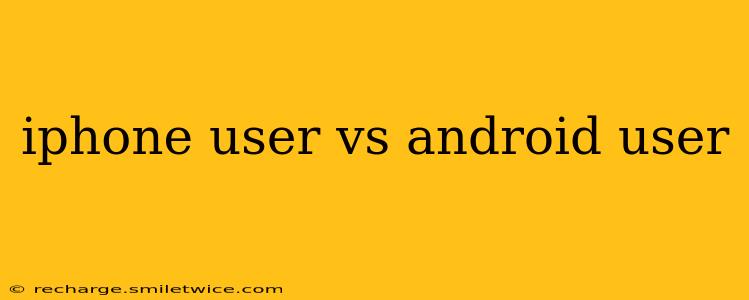The age-old debate: iPhone versus Android. Which operating system reigns supreme? The truth is, there's no single "better" choice – the ideal phone depends entirely on individual needs and preferences. This comprehensive comparison explores the key differences between iPhone and Android users, delving beyond superficial features to uncover deeper behavioral and technological distinctions.
What are the main differences between iPhone and Android?
This is a broad question, often stemming from the initial purchase decision. The main differences aren't just about features but also encompass the entire user experience. iPhones typically offer a more streamlined, intuitive interface with a strong emphasis on ease of use and a consistent user experience across all Apple devices. Android, on the other hand, boasts greater customization options, allowing users to personalize nearly every aspect of their phone. This flexibility is a major draw for tech-savvy individuals who enjoy tinkering with settings and exploring different applications. The underlying operating systems (iOS and Android) themselves are distinct, resulting in different app ecosystems, update schedules, and overall software philosophies.
What is the biggest difference between iPhone and Android users?
While generalizations can be inaccurate, a significant difference often lies in the user's approach to technology. iPhone users frequently prioritize simplicity and seamless integration within the Apple ecosystem. They often appreciate the ease of use, the consistent user experience across devices, and the robust security features. Android users, conversely, often value customization, flexibility, and the ability to tailor their devices to their specific needs. They might be more comfortable exploring different apps, widgets, and launchers to personalize their experience. This difference in approach often shapes their technology choices beyond just the phone itself.
Do iPhone users have more money?
This is a common misconception. While Apple products generally sit at a higher price point, this doesn't inherently correlate with users' overall financial status. Many factors contribute to phone choice, including brand loyalty, perceived value, ecosystem integration, and access to financing options. Therefore, it's inaccurate to assume all iPhone users are wealthier than Android users.
Why do people prefer iPhones over Androids?
Many people prefer iPhones for their ease of use, intuitive interface, and seamless integration with other Apple devices. The strong emphasis on privacy and security, combined with reliable software updates, also contributes to their popularity. The curated App Store, while potentially more restrictive than the Google Play Store, is often lauded for its generally higher quality control and user experience.
Why do people prefer Android over iPhones?
Android's open-source nature and extensive customization options are major attractions. Users appreciate the flexibility to personalize their home screens, widgets, and even the operating system itself. The vast selection of devices at various price points caters to a broader range of budgets. Further, the Google Play Store offers a wider range of apps, though quality control might be more variable than the App Store.
What are the pros and cons of each?
iPhone Pros: Ease of use, seamless integration with other Apple devices, strong security and privacy features, consistent user experience, reliable software updates, high-quality apps (App Store).
iPhone Cons: Higher price point, less customization options, limited device choices, potentially less app variety compared to Android.
Android Pros: Extensive customization options, wide range of devices at various price points, large app selection (Google Play Store), open-source nature, more flexibility.
Android Cons: Can be more complex for beginners, software updates can be inconsistent across devices, quality control of apps in the Play Store can be more variable, security concerns can be more prevalent on less secure devices.
Conclusion: It's About Personal Preference
Ultimately, the "better" operating system is subjective. iPhone users value simplicity, seamless integration, and a premium user experience. Android users appreciate customization, flexibility, and a wider range of choices. The best choice depends entirely on individual needs and preferences. Consider your priorities and technological comfort level when making your decision.
